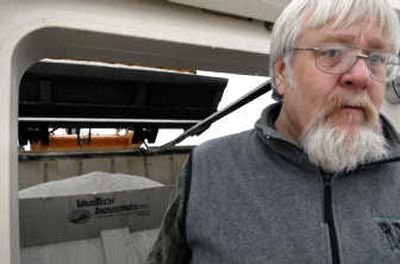Favored deicer getting tougher to find

Deicer can be difficult to come by for Tim Martin.
The city of Coeur d’Alene’s street superintendent often finds himself battling for magnesium chloride that always seems in short supply.
“When I need it, the city of Spokane needs 40,000 gallons,” Martin said. The deicer is used by most cities across the Northwest. “We’ve had to wait up to two weeks to get material.”
But other options are beginning to attract attention, particularly among the budget conscious and those worried about keeping a supply of deicer in stock.
Across town from Martin’s office, Idaho state employee Judd Reed spends his days mixing giant batches of salt brine for the Idaho Transportation Department. The plant is capable of storing 48,000 gallons of the cheaper alternative to magnesium chloride, and it can produce enough in one day to deice Coeur d’Alene’s roads 10 times over.
It’s an endeavor that began as an experiment two years ago and now serves as the state agency’s sole supply of road deicer for North Idaho highways. And Martin has taken notice. He plans to ask the Coeur d’Alene City Council to buy a salt brine maker for city use.
The lower cost of the salt brine – 12 cents a gallon compared with about 74 cents a gallon for magnesium chloride, according to the ITD – makes it a great investment, Martin said. An on-site supplier would solve the shortage problem, he said.
ITD estimates the department would have spent more than $700,000 this year to buy and ship magnesium chloride to the area, while making salt brine will cost about $170,000.
But not everyone is wild about salt brine. The Washington State Department of Transportation considers it more corrosive than magnesium chloride, which also is considered one of the products least harmful to the environment. In Washington, state road crews have both types of deicers available but prefer magnesium chloride. Spokane County and the cities of Spokane and Spokane Valley also rely on magnesium chloride.
The state makes its own salt brine in Ritzville and has been using it on state roads there since 2003 to test its viability, but there are no immediate plans to expand its use, state transportation spokesman Al Gilson said. State crews have found magnesium chloride to be less corrosive to steel than salt, Gilson said.
North Idaho county road crews still use magnesium chloride, though Reed suspects the cost and convenience of salt brine will lead them to switch products soon.
“It’s worked very well this winter. … We have a lot of people come over and look at it,” he said, noting the increased cost of magnesium chloride. “All agencies are going to have to learn to save a little money.”
Idaho’s brine machine cost about $6,000, Reed said. Deicing chemicals have shown up in water samples taken from the Spokane Valley/Rathdrum Prairie Aquifer, and WSDOT is studying a possible link between deicing chemicals and the browning of pine needles on trees near roadways. Idaho noticed a similar problem last year when testing salt brine on Interstate 90 – pine trees dropped needles in the spring but didn’t die.
An especially dry spring may have contributed to the problem, said John Perfect, regional maintenance engineer for ITD. “It’ll be interesting to see where we’re all at this spring.”
Washington state puts anti-corrosive additives into its magnesium to lessen the effects, Gilson said.
Still, transportation officials recommend washing cars every few weeks, regardless of the type of deicer used. “Just because it’s the winter doesn’t mean you should stop washing your car,” said ITD spokeswoman Barbara Babic.